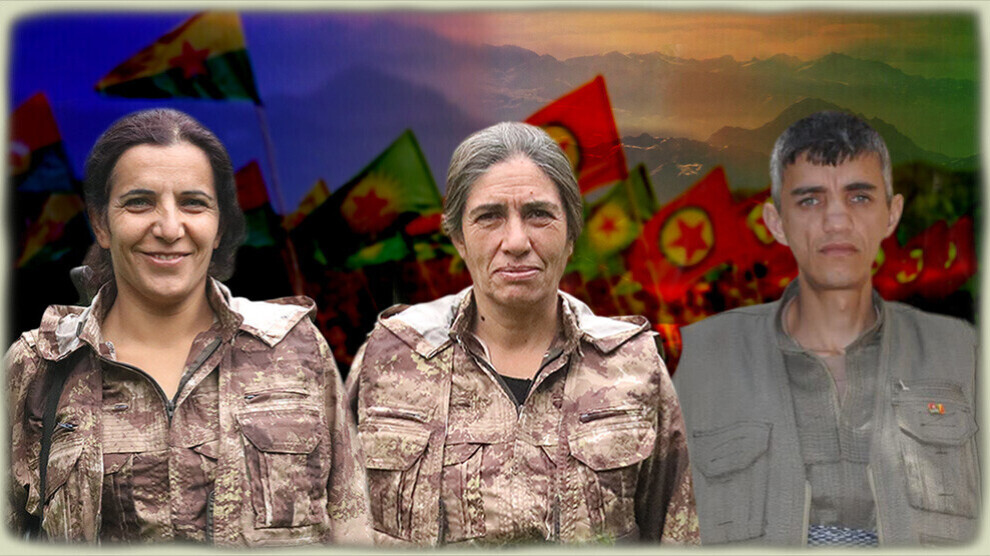HPG pays tribute to three fallen guerrillas
Guerrillas Rozerîn Şemzînan, Tekoşîn Cizre and Harun Egîd died in a Turkish attack in the Medya Defense Areas on 24 August.
Guerrillas Rozerîn Şemzînan, Tekoşîn Cizre and Harun Egîd died in a Turkish attack in the Medya Defense Areas on 24 August.

The Press Center of the People's Defense Forces (HPG) has published the names of three martyrs. According to the information released, guerrillas Rozerîn Şemzînan, Tekoşîn Cizre and Harun Egîd died in a Turkish attack in the Medya Defense Areas on 24 August. The three fallen guerrillas had been active in the Kurdish liberation movement for many years. The HPG paid tribute to them saying that they were "exemplary militants who fought with great sacrifice for the freedom of their people." The HPG expressed its condolences to the relatives and people of Kurdistan.
The identities of the three martyrs are as follows:
 Codename: Rozerin Shemzinan
Codename: Rozerin Shemzinan
First and last name: Sarya Atilla
Place of birth: Colemêrg
Names of mother and father: Gila – Reşit
Date and place of death: 24/8/2023, Medya Defense Areas
 Code name: Tekoşîn Cizre
Code name: Tekoşîn Cizre
First and last name: Ayşe Arslan
Place of birth: Sêrt
Names of mother and father: Emine – Nezir
Date and place of death: 24/8/2023, Medya Defense Areas
 Code name: Harun Egîd
Code name: Harun Egîd
First and last name: Mehmet Akın
Place of birth: Mêrdîn
Names of mother and father: Fatma – Hüseyin
Date and place of death: 24/8/2023, Medya Defense Areas
Rozerin Şemzînan
Rozerîn Şemzînan was born in the village of Gara in Colemêrg-Şemzînan (Hakkari-Şemdinli) and belonged to the Gerdî tribe. The guerrillas were very present in the area, so Rozerîn knew about the PKK as a child. Because the guerrillas came to her village, she also made personal acquaintances and was particularly impressed by the women fighters.
Her family was subjected to great pressure from the Turkish state and relatives were arrested. Rozerîn rejected the traditional female role within the system and became politically active. In 2007, she went to the mountains and did basic training as a guerrilla in Xakurke. She focused on women's liberation ideology and took a leading role as a PAJK militant and guerrilla. Until 2015, she stayed in the Xakurkê, Xinêre and Zap regions. She then went to Shengal to defend the Yazidi community against ISIS. After the region was liberated from the Islamic State, she returned to the mountains in 2018 and fought against Turkish occupation attacks as a unit commander in Xakurke.
Tekoşîn Cizre
Tekoşîn Cizre was born in Sêrt-Dih (Siirt-Eruh) and belonged to the Didêrî tribe. When she was eight years old, she witnessed the beginning of the PKK armed struggle on 15 August 1984. The following years were characterized by the hope that emerged among the population.
She later found the opportunity to get to know the guerrillas personally and learn something about Abdullah Öcalan's philosophy. Under this influence, she rebelled against the traditional role of women in society and wanted to join the guerrillas. For this purpose, she went to Çewlîk (Bingöl) in 1994, where she was arrested. She spent the next ten years in Turkish custody and took part in the prison struggle. After her release in 2004, she was politically and socially active in various areas in North Kurdistan and Turkey. When ISIS attacked Kobanê in 2014, she went to Rojava and took part in the resistance against the Islamists. After the liberation of Kobanê, she worked for social reconstruction and, based on her experiences, was able to make a significant contribution to the system created by the Rojava Revolution.
In 2017, she saw her task in Rojava fulfilled and went to the mountains. Her long-awaited guerrilla life began in Xakurke. She continued her education at PKK academies and took on various tasks. As a member of the YJA Star, she looked after young female fighters and took part in the construction of underground defenses. She resisted the Turkish occupation attacks until the end.
Harun Egîd
Harun Egîd was the son of a patriotic family from Mêrdîn-Nisêbîn (Mardin-Nusaybin). The family was forced to move to Adana due to state repression in the 1990s, but held on to their Kurdish identity and preserved the tradition of resistance for which Nisêbîn is known.
Harun got to know the PKK in 1993 and took part in revolutionary youth work as an adolescent. He continued this commitment for a long time until he went to the mountains in 2013 and joined the guerrillas. He received basic training in Avaşîn and consciously lived in Kurdistan for the first time. In his own words, he experienced life in the free mountains of Kurdistan as a return to his own self. After three years of practice in Avaşîn, he went to Xakurke and took on tasks that required great trust in him. During this time, he got to know the reality of his people and thus himself better and dealt with his personality and the ideology of Abdullah Öcalan. As the Turkish invasion attacks on the Medya Defense Areas intensified, he went to the Goşînê area in 2019 at his own suggestion and took a leading role in the construction of tunnel systems.